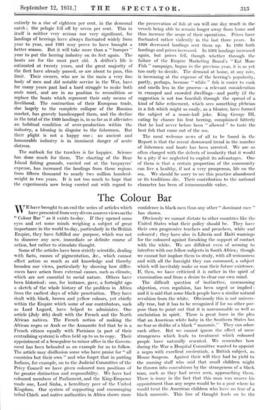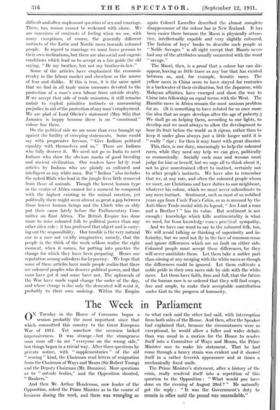The Colour Bar
WE have brought to an end the series of articles which have presented from very divers sources views on the " Colour Bar " as it exists to-day. If they opened some eyes and set some minds weighing a subject of great importance in the world to-day, particularly in the British Empire, they have fulfilled our purpose, which was not to discover any new, immediate or definite course of action, but rather to stimulate thought.
Some of the articles have been strictly scientific, dealing with facts, causes of pigmentation, &c., which cannot affect action so much as aid knowledge and thereby broaden our views, particularly by showing how differ- ences have arisen from external causes, such as climate, which are not essential to racial nature. Others have been historical : one, for instance, gave, a fortnight ago a sketch of the whole history of the problem in Africa from the earliest days of white penetration. They have dealt with black, brown and yellow colours, yet chiefly within the Empire which some of our contributors, such as Lord Lugard, have helped to administer. One article (July 4th) dealt with the French and the North African natives. The French notion of making the African negro or Arab or the Annamite feel that he is a French citizen equally with Parisians (a part of their centralizing system) is often held up to us to copy. Their appointment of a Senegalese to minor office in the Govern- ment has been belauded as an example for us to follow. The article may disillusion some who have praise for " all countries but their own " and who forget that in putting Indians, for example, on to the Judicial Committee of the Privy Council we have given coloured men positions of far greater distinction and responsibility. We have had coloured members of Parliament, and the King-Emperor made one, Lord Sinha, a hereditary peer of the United Kingdom. Our system of supporting and encouraging tribal Chiefs and native authorities in Africa shows more confidence in black men than any other " dominant race " has shown.
Obviously we cannot dictate to other countries like the United States what their policy should be. They have their own progressive teachers and preachers, white and coloured ; they have also in Liberia and Haiti warnings for the coloured against forsaking the support of contact with the white. We are diffident even of seeming to interfere with our fellow-subjects in South Africa; though we cannot but implore them to study, with all seriousness and with all the foresight they can command, a subject which will inevitably make or mar their future existence. If, then, we have criticized it is rather in the spirit of examination and from a desire to clear our own mind.
The difficult question of instinctive, unreasoning objection, even repulsion, has been urged or implied : and it is said that some black people have a similar natural revulsion from the white. Obviously this is not univers- ally true, but it has to be recognized if for no other pur- pose than to point out that it is unreasonable as well as unchristian in spirit. There is great force in the plea that an American white baby in the Southern States has no fear or dislike of a black " mammie." They can adore each other. But we cannot ignore the effect of mere strangeness which leads to treatment which coloured people have naturally resented. We remember how during the War a Hospital Committee wanted to appoint a negro with excellent credentials, a British subject, as House Surgeon. Against their will they had to yield to the nursing staff who said that small children might be thrown into convulsions by the strangeness of a black man, such as they had never seen, approaching them. There is irony in the fact that this man was nearer his appointment than any negro would be to a post where he would treat the American children who have no fear of a black mammie. This line of thought leads on to the difficult and often unpleasant question of sex and marriage. There, too, reason cannot be reckoned with alone. We are conscious of contrasts of feeling when we see, with many exceptions, of course, the generally different instincts of the. Latin and Nordic races towards coloured people. In regard to marriage we must leave persons to their own inclinations, but there are also social and eugenic conditions which lead us to accept as a fair guide the old saying, " Be my brother, but not my brother-in-law."
Some of the articles have emphasized the economic rivalry in the labour market and elsewhere as the source of fear and dislike. If this is true, it is the same spirit that we find in all trade union measures devoted to the protection of a man's own labour from outside rivalry. If we accept that side of trade unionism, it still remains unfair to exploit primitive instincts or unreasoning prejudice in aid of the protection of any man's employment. We are glad • of Lord Olivier's statement (May 9th) that Jamaica is happy because there is no " vocational " colour bar there.
On the political side we are more than ever brought up against the futility of sweeping statements. Some would say with progressive fervour, " Give Indians political equality with themselves and us." There are Indians who fully deserve it. We need not go to India to meet Indians who show the obvious marks of good breeding and ancient civilization. Our readers have lately read articles by Indians who are plainly as cultured and intelligent as any white man. But " Indian" also includes the naked Bhils who lead in the jungle lives little removed from those of animals. Though the lowest human type in the centre of Africa cannot for a moment be compared with the highest existing in the animal creation, yet politically there might seem almost as great a gap between those lowest human beings and the Chiefs who so ably put their cause lately before the Parliamentary Com- mittee on East Africa. The British Empire has done more to raise coloured folk to political power than any other alien rule : it has professed that object and is carry- ing out the responsibility. Our trouble is the very natural one in a race not vividly imaginative, namely, that the people in the thick of the work seldom realize the right moment, when it comes, for putting into practice the change for which they have been preparing. Hence our reputation among onlookers for hypocrisy. We hope that sonic of these articles have made people realize that there are coloured peoples who deserve political power, and that some have got it and sonic have not. The upheavals of the War have made rapid change the order of the day, and where change is due only the demented will resist it, probably to their own undoing. Within the Empire again Colonel Lascelles described the almost, complete disappearance of the colour bar in New Zealand. It has been easier there because the Maori is physically attrac- tive, intellectually capable and very slightly coloured. The fashion of boys' books to describe such people as " Noble Savages " is all right except that Maoris never had any of the attributes usually connected with the word " savage."
The Maori, then, is a proof that a colour bar can dis- appear, leaving as little trace as any bar that has existed between us, and, for example, Semitic races. The yellow races in China seem to have stayed for centuries in a backwater of their civilization, but the Japanese, with Malayan affinities, have emerged and show the way to China into fellowship on equal terms with the West. The Hamitic races in Africa remain the most anxious problem for us. (It is something to have refuted for us once more the idea that no negro develops after the age of puberty.) We shall go on helping them, according to our lights, to develop and we need always to allow the development to bear its fruit before the world as it ripens, rather than to keep it under glass always just a little longer until it is " really " ripe ; for then it may burst with great disaster.
This, then, is our duty, unceasingly to help the coloured races, while they need any help we can give, politically or economically. Socially each man and woman must judge for him or herself, but we urge all to think about it, not to give unrestrained effect to instinct, certainly not to other people's instincts. We have also to remember that we, at any rate, and often the coloured people whom we meet, are Christians and have duties to our neighbour, whatever his colour, which we must never subordinate to any mere instinct. Sentiment, such as most of us imbibed years ago from Uncle Tom's Cabin, or as is aroused by the Anti-Slave Trade medal with its legend, " Am I not a man and a Brother ? " has its value. But sentiment is not. enough ; knowledge which kills sentimentality is what we need, for from knowledge comas practical sympathy.
And we have one word to say to the coloured folk, too. We will avoid talking or thinking of superiority and in- feriority, but we need not fly in the face of common sense and ignore differences which are no fault on either side. Coloured people must accept these differences, for they will never annihilate them. Let them take a nobler part than aiming at any merging with the white races as though the differences could be ignored. Let them cultivate a noble pride in their own races side by side with the white races. Let them have faith, firm and full, that the future of the human race is so ordered that they will find scope, free and ample, to make their acceptable contribution under God to the progress of humanity.































 Previous page
Previous page